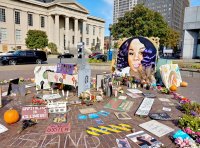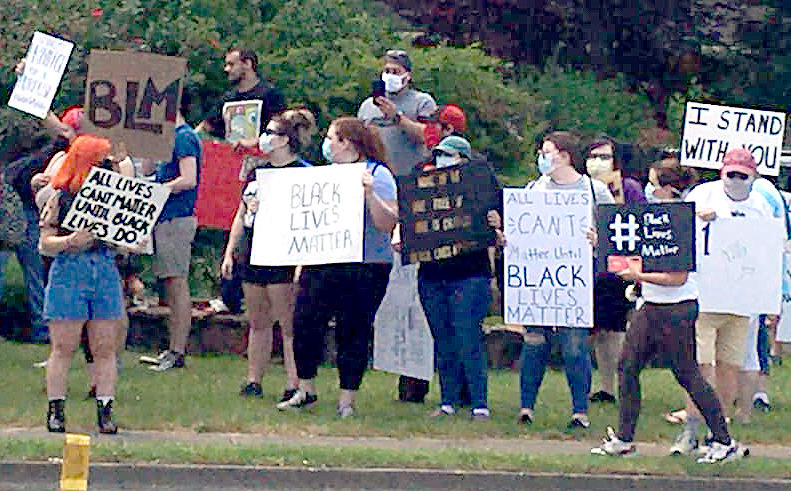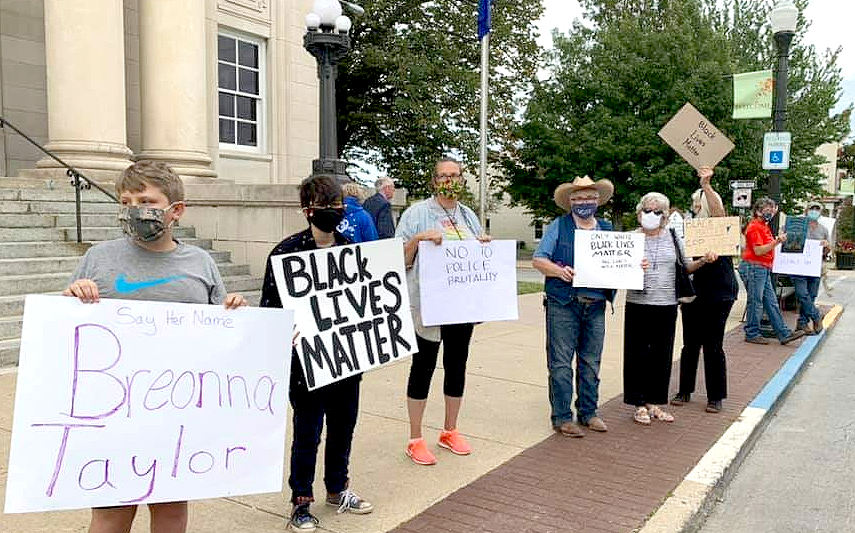Justice for Breonna Taylor: Amplifying and learning from the Louisville uprising

On March 13, 2020 Louisville Metro Police Department (LMPD) murdered Breonna Taylor – a 26-year-old Black woman, award-winning EMT and beloved community member – while she was resting in her own home.
Coinciding with a nationwide uprising for racial justice and Black liberation, Breonna Taylor’s death has sparked a months-long resistance movement in Louisville and across Kentucky.
KFTC is launching a political education curriculum in 2021 where we will learn from abolitionist perspectives about defunding the police and moving toward our vision for ALL people to enjoy a better quality of life. Sign up to stay informed on when this curriculum will launch at cutt.ly/PoliEdSeries
For months, organizers committed to protecting racial justice in Louisville have demanded accountability for the police officers who murdered Taylor, divesting from the Louisville Metro Police Department’s $190 million annual budget and reinvesting in community resources.
These demands have been amplified and repeated throughout the country and Kentucky – from Lexington’s movement for police accountability
(lpdaccountability.com) to countless solidarity actions in rural and small towns.
It’s also true that the Louisville uprising has come with incredible loss and hardship. These include the murder of David “YaYa” McAtee, a Black man killed by National Guard and Louisville police outside the barbecue restaurant he owned; the murder of Tyler Gerth, a white photographer and activist shot in Injustice Square Park, where protesters have taken up space and erected a memorial for Breonna Taylor; and the LMPD arrest of hundreds of protesters speaking out against white supremacy.
Attorney General Cameron’s failure to deliver justice for Taylor through the grand jury proceedings also contributed to the movement’s hardship.
Despite these challenges, Louisville organizers have shaped one of the most long-standing and resilient movements in the country. Thanks to the leadership of Black, Indigenous and People of Color organizers, the uprising continues.
 Breonna’s Law – a win for Louisville, and hopefully for Kentucky
Breonna’s Law – a win for Louisville, and hopefully for Kentucky
Due to this leadership, particularly the leadership of Black women, the city of Louisville has already seen some remarkable wins in this uprising.
One of the most notable wins was when Louisville’s Metro Council listened to public pressure, led by ACLU strategist Keturah Herron and others, to unanimously pass “Breonna’s Law” – which banned the use of “no-knock” warrants (the type of warrant used by LMPD the night Breonna died).
Attica Scott, a long-time KFTC ally who serves as the only Black woman in the state legislature, is leading the movement to ban no-knock warrants beyond Louisville. In August, she pre-filed legislation for a statewide Breonna’s Law, to be considered by the 2021 General Assembly (learn more and become a “community cosponsor” of the legislation at atticascott4ky.com/breonnas-law).
Looking Forward
The uprisings for racial justice, combined with a pandemic and an election season like no other, have offered important lessons. The work for KFTC members, and all Kentuckians, in 2021 is to learn from events of 2020 to achieve the anti-racist Kentucky.
“We have learned the importance of abolitionist frameworks in our organizing – and that to invest in community, we need to divest from the systems that don’t serve us,” pointed out Aja Holston-Barber, who consults with KFTC on equity issues.
“We have learned that we need to show up for each other, and to create spaces and ecosystems for people to show up for each other.”
All Kentuckians have a role in this work, KFTC members are learning. There is a role for white people doing self-work and working with other white people to move toward an anti-racist vision.
There is a role for rural-urban solidarity in the face of white supremacy and scarcity.
There is a place and a need for the progressive movement in Kentucky to keep leaning into a deeper commitment to anti-racist organizing that brings about our collective liberation.
And, perhaps most important, this uprising demonstrates that Black, Indigenous and people of color people are showing up, are leading and are ready to be supported. It’s up to the rest of us – Kentuckians and KFTC members – to create the support and resources and ecosystem where they can thrive.

Honoring and supporting KFTC allies
Take a moment to read about, honor and consider supporting the leadership of some of the Black- and People of Color-led organizations that collectively make up an ecosystem of support for the uprising.
Change Today, Change Tomorrow (change-today.org) helps Louisville’s predominantly Black community in the West End access fresh food and groceries, after one of just two grocery stores closed following the National Guard’s murder of David McAtee. Though the grocery store reopened, CTCT’s #FeedTheWest program, spearheaded by Shauntrice Martin, will continue on through Martin’s work to open the Black Market (facebook.com/BlackMarketKY), a Black-owned and sustainable fresh food source for West End residents.
Kentucky Alliance Against Racist and Political Repression (kentuckyalliance.org) is a 45-year-old organization that supports the occupation of Injustice Square Park (formerly called Jefferson Square Park) in Louisville throughout the uprising. Injustice Square park has served as a memorial to Breonna Taylor, a hub for activists to be in community, and a space of political education and shared grief. As of early December, the occupation had lasted continuously for 190 days.
Black Lives Matter Louisville (blackliveslouisville.org) plays an important role in broadening the narrative and lifting up demands to dismantle the system that killed Breonna Taylor, including through divesting from the LMPD and re-investing in community (investdivest.org for more). BLM Louisville offers support for housing, bail and jail support, and led many of the uprising’s direct actions.
The Louisville Bail Project (bailproject.org/city/louisville) provides crucial jail support by posting bail for protesters arrested while demanding justice for Breonna Taylor and is a consistent presence in holding down Injustice Square Park.
Collective Liberation Network (instagram.com/collectiveliberationnetwork) provides direct support to the Louisville uprising by coordinating necessary mutual aid to support queer and trans BIPOC leaders in Louisville, organizing meals for protesters, amplifying important organizing opportunities related to the uprising via social media, and more.
Louisville Showing Up for Racial Justice, or Louisville SURJ (louisvillesurj.org), and Southern Crossroads (fight4thesouth.org), although not Black and brown-led, have been doing the crucial work of organizing white people for racial justice in Louisville and in small towns in the South.
Recent News
Kentucky’s past legislative session showed alarming trend toward government secrecy
Churchill Downs takes more than it gives. That's why the Kentucky Derby is a no-go for me
‘We must never forget.’ Kentucky town installs markers for lynching victims.
Featured Posts
Protecting the Earth
TJC Rolling Out The Vote Tour – a KFTC Reflection Essay
KFTC Voter Empowerment Contractor Reflection Essay
Archives
- Home
- |
- Sitemap
- |
- Get Involved
- |
- Privacy Policy
- |
- Press
- |
- About
- |
- Bill Tracker
- |
- Contact
- |
- Links
- |
- RSS

